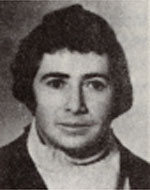Marcel, son of Elka and Barish, was born on November 3, 1947, in Sani, Romania, and immigrated to Israel with his family in 1963. He studied in an elementary school and vocational school in Romania, “And” Mickey, “he lived in a small town in Romania, many of whose inhabitants were Jews, was an alert and playful boy, and after graduating from elementary school, he studied in a vocational school and began working on wood molds for molding. In Kfar Hassidim, and Marcel spent some time at Kibbutz Afek, where he learned Hebrew in the ulpan, and when he returned to his parents’ home, he was filled with love for the country, its landscapes and its people, even though he had never known anything about the country. He was active in many sports and in Israel he was a member of Hapoel and played soccer in a local team in the Rachasim, where he lived, Marcel was cheerful, energetic and strong, and gave him confidence. Haifa Marcel was drafted into the IDF in mid-May 1966 and assigned to the Golani infantry brigade. After completing basic training, he volunteered to serve in a well-known commando unit, while serving in the IDF during the Six-Day War, in battles in the Golan Heights, and took part in routine security operations after the war. He took a course in routine security for commanders. His commanders saw him as a responsible, devoted, capable and capable soldier. His discharge certificate indicated that he was a disciplined soldier, fulfilling his duties to the satisfaction of his commanders. After completing his regular service, he was assigned to reserve duty in the Armored Corps. Later he was transferred to a patrol unit of the Armored Corps and served there as a scout. In 1972, Marcel married a wife and the couple continued to live in the Ranges, and he wanted to build his house with his own hands, and he continued to work as a carpenter in Haifa. In the last year of his life, Marcel began active public activity in the Ranges, and before the elections in the fall of 1973 he was nominated to the local council for a local list of young people he had established, and many hoped that he would revive and develop the neglected ridges. The construction of the soccer field at the site and the construction of the youth club, where he also guided young people to work In the Battle of the Suez Canal, in the battle of the Suez Canal, and in the battle to secure the bridgehead on the banks of the Suez Canal, On October 18, 1973, when he was in the company’s armored personnel carrier near the Chinese Farm, Marcel was hit and killed, and he was brought to eternal rest in the cemetery. He left behind a wife, parents, sister and brother. After his fall, he was promoted to sergeant. In a letter of condolence to the bereaved family, the unit commander wrote: “His actions and his perseverance in this long war served us as a source of strength for us, his comrades, and he was loved and accepted by his comrades and commanders.” His parents donated a memorial to the “She’erit HaPleita” Synagogue in Rechasim; His patrol unit published a pamphlet in memory of its fallen soldiers in the war, which also included things about Marcel.
